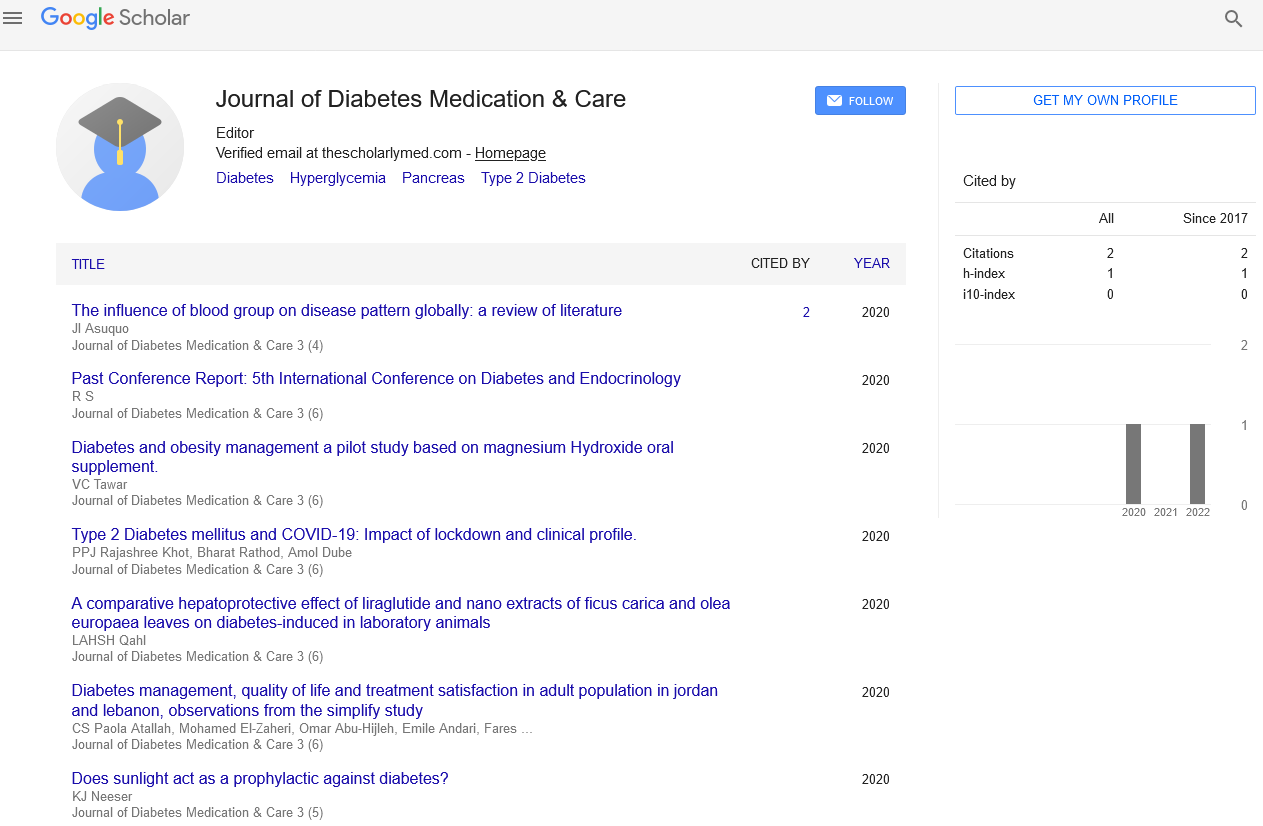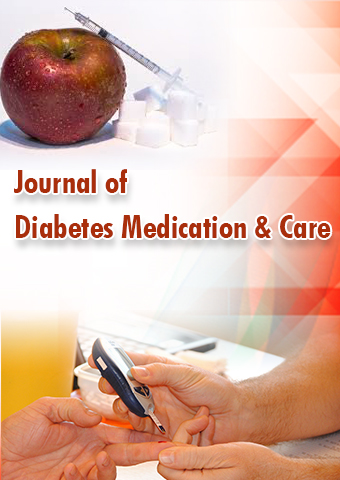Mini Review - Journal of Diabetes Medication & Care (2023) Volume 6, Issue 2
Perspectives and experiences of Patients with type 2 diabetes
Dr. Shivani P*
Department of Medicine, Albania
Department of Medicine, Albania
E-mail: shiv@nigmail.com
Received: 03-April -2023, Manuscript No. jdmc-23-94828; Editor assigned: 06-April -2023, PreQC No. jdmc- 23-94828 (PQ); Reviewed: 20-April -2023, QC No. jdmc-23-94828; Revised: 22-April -2023, Manuscript No. jdmc-23-94828 (R); Published: 29-April -2023; DOI: 10.37532/ jdmc.2023.6(2).29-31
Abstract
Diabetes is more and more more turning into a chief fitness hassle in Jordan and glycemic desires are frequently now no longer achieved.To discover the sufferers` views concerning kind 2 diabetes and its control so as to "fine-tune" destiny pharmaceutical care intervention programs.Focus businesses approach turned into used to discover perspectives from people with kind 2 diabetes attending outpatient diabetes health facility on the Royal Medical Services Hospital. All interviews had been recorded, transcribed and analyzed the use of a thematic evaluation approach.A general of 6 attention businesses, with 6 individuals in every one, had been conducted. Participants withinside the gift examine proven a extraordinary records wishes approximately diabetes and the prescribed remedy. Medication routine traits inclusive of rout of administration, quantity of prescribed medicines and dosage frequency further to perceived aspect outcomes represented the foremost limitations to remedy adherence. In addition to demonstrating terrible ideals approximately the contamination and the prescribed medicines, individuals confirmed terrible attitudes and coffee self-efficacy to stick to essential self-care sports inclusive of diet, bodily pastime and self-tracking of blood glucose.Future pharmaceutical care interventions designed to enhance sufferers` adherence and fitness consequences in sufferers with kind 2 diabetes ought to recall enhancing sufferers` knowledge of kind 2 diabetes and its control, simplifying dosage routine, enhancing patient`s ideals and attitudes towards kind 2 diabetes, prescribed medicines and exceptional self-care sports further to enhancing patient`s self efficacy to carry out exceptional remedy recommendations.Pharmaceutical • Diabetes
Introduction
Diabetes is a major public health problem and economic burden worldwide. Diabetes prevalence is increasing dramatically worldwide, especially in developing countries, including Jordan. In 1980 he had 108 million people with diabetes, but in 2014 he was estimated to have 422 million adults with diabetes. According to World Health Organization data, diabetes-related mortality in Jordan has increased from 1% in 2002 to 7% in 2010. Uncontrolled diabetes leads to long-lasting microvascular and macrovascular complications, including retinopathy, nephropathy, neuropathy, and cardiovascular disease [1-3].
Patient non-adherence to treatment regimens and lifestyle advice is a major obstacle to achieving desirable glycemic control to prevent diabetes-related complications. Available data indicate that improved adherence leads to better clinical outcomes. However, despite its importance, available information on adherence in people with type 2 diabetes is sparse. A study conducted in Jordan found that almost three-quarters of the 171 study participants were classified as non-adherents. Factors associated with poor adherence to recommended treatments have been evaluated in various studies, but the patient’s perspective and involvement in treatment decisions and care plan design was very low. Patients with diabetes are estimated to be responsible for 95% of their own care, and it is estimated that one of the reasons for poor outcomes in diabetes treatment is the lack of patient involvement, thus requiring a patient-centred approach [4]. Having one is very important. To better adhere to prescribed treatments, healthcare professionals need to understand and consider the factors that enable patients to adhere. The first step in developing effective interventions is to understand the factors that help people with type 2 diabetes adhere to regimens and lifestyle recommendations. , little is known about the barriers faced by diabetics. Qualitative research, including focus group methods, allows access to areas inaccessible to quantitative methodologies and allows the introduction of new themes and ideas needed to design effective interventions. Focus groups not only improve the participation of illiterate people, but they also allow participants to: B. Personal interviews. A qualitative study in the form of a focus group method was selected in this study to obtain an in-depth examination of patients’ perceptions and attitudes when dealing with type 2 diabetes. There is limited information in the literature about what people with diabetes feel and think about their adherence to treatment. To our knowledge, this study is the first to examine the experiences of her type 2 diabetic patients in Jordan. The results of the current study are intended to inform future diabetes care programs that are tailored to patient needs and aimed at improving health outcomes for people with type 2 diabetes [5-7].
Data analysis
The focus group tapes were transcribed verbatim and the transcripts were checked for accuracy against the original tapes. The transcript was translated into English and he was translated into Arabic by two independent translators to ensure content consistency. Each transcript was individually encoded by her three members of the research team. Data were analyzed using a thematic analysis approach [8-10]. We read, reread, and summarized the transcripts for each focus group. Raised issues were grouped under potential thematic categories and often renamed as more appropriate titles emerged. The ideas and problems that emerged were categorized and further organized by theme. After this exercise was conducted independently, team members met to discuss and agree on a final framework for explaining and evaluating the information and views presented by the patients.
Discussion
The focus group interviews discussed in the current study represent a group interactionbased qualitative research method for designing and refining interventions by examining patient experiences with disease and health problems. Focus groups encourage participants to share information about their experiences and perspectives, talk to each other, ask questions, and listen to what others have to say. This allows participants to clarify their issues. This is because, with the guidance of the focus group leader, group members can explain the reasons for their actions, perceptions, beliefs, and attitudes in ways that are not readily accessible in one-on-one interviews. The results of this study show that the combination of lack of knowledge and complexity of treatment plans makes it very difficult for patients to adhere to prescribed treatments. Consistent with other findings, participants in this study demonstrated a low level of knowledge and a high need for information about type 2 diabetes and its management. Lack of knowledge has been found to be one of the reasons why patients do not treat diabetes effectively. A recent focus group study uncovered unmet information needs in her type 2 diabetic patients in Australia. Although knowledge alone does not guarantee behavior change or effective self-management, assessing diabetes-related knowledge is an important first step in personalizing diabetes education programs and evaluating their effectiveness.
Conclusion
Patients generally have a low level of knowledge about type 2 diabetes, which can affect their approach to disease management. Patients also articulated a need for information about their prescribed medication, including efficacy, dosage, possible side effects, and time required to achieve desired glycemic control. Personalized patient education. Meeting this information need through programs should be considered in future effective pharmaceutical care interventions. Concerns about dosing frequency and the number of drugs prescribed to some patients indicate that dosing regimens need to be as streamlined as possible. Insulin injections were not a common treatment option. The study also found that patients had a negative view of their medication. This was reflected in concerns about the efficacy of prescribed drugs. The patient was very concerned about possible side effects of the drug. The literature reports that such concerns impact patient adherence and need to be addressed. While some patients exhibited positive illness beliefs related to their perception of disease severity and susceptibility to complications, many patients exhibited negative illness beliefs and attitudes. Such concerns and beliefs should be revisited in future intervention programs. Adherence to lifestyle counseling was influenced by negative attitudes towards lifestyle change, lack of awareness of the importance of different elements of lifestyle counseling, and low self-efficacy. These barriers will be targets for future diabetes care programs.
References
- Roberts CK, Won D, Pruthi S et al. Effect of a short-term diet and exercise intervention on oxidative stress, inflammation, MMP-9, and monocyte chemotactic activity in men with metabolic syndrome factors. J Appl Physiol. 100, 1657-65 (2006).
- Schwingshackl L, Hoffmann G, Lampousi AM et al. Food groups and risk of type 2 diabetes mellitus: a systematic review and meta-analysis of prospective studies. Eur J Epidemiol 32, 363-375 (2017).
- Raina Elley C, Kenealy T. Lifestyle interventions reduced the long-term risk of diabetes in adults with impaired glucose tolerance. Evidence-Based Medicine. 13, 173 (2008).
- Schellenberg ES, Dryden DM, Vandermeer B et al. Lifestyle interventions for patients with and at risk for type 2 diabetes: a systematic review and meta-analysis. Annals of Internal Medicine. 159, 543-551 (2013).
- Afkarian M, Zelnick LR, Hall YN et al. Clinical manifestations of kidney disease among US Adults with diabetes. J Am Med Assoc.316, 602-610 (2016).
- Kume S, Araki SI, Ugi S et al. Secular changes in clinical manifestations of kidney disease among Japanese adults with type 2 diabetes from 1996 to 2014. J Diabetes Investig.12,32-34 (2018).
- Bunn HF, Higgins PJ. Reaction of monosaccharides with proteins: possible evolutionary significance. Science. 213. 222-224 (1981).
- Miedema K. Standardization of HbA1c and Optimal Range of Monitoring. Scand J Clin La Investig. 240, 61-72 (2005).
- Melina Vesanto, Craig Winston, Levin Susan et al. Position of the Academy of Nutrition and Dietetics: Vegetarian Diets. J Acad Nutr Diet.116, 1970-1980 (2016).
- Mueller-Stierlin AS, Cornet Sebastian, Peisser Anna et al. Implications of Dietary Intake and Eating Behaviors for People with Serious Mental Illness: A Qualitative Study. Nutrients. 14, 2616 (2022).
Indexed at, Google Scholar, Cross ref
Indexed at, Google Scholar, Crossref
Indexed at, Google Scholar, Crossref
Indexed at, Google Scholar, Cross Ref
Indexed at, Google Scholar, Crossref
Indexed at, Google Scholar, Crossref
Indexed at, Google Scholar, Crossref
Indexed at, Google Scholar, Crossref
Indexed at, Google Scholar, Cross Ref

